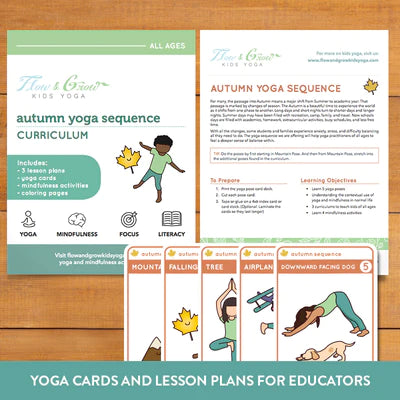Your Cart is Empty
22% off Automatically at checkout when you spend $5 of more!
22% off Automatically at checkout when you spend $5 of more!

Early Childhood Educators Need Support! How Can Yoga, Mindfulness, SEL, and Self-Care Provide It?
by Lara Hocheiser October 25, 2019 2 min read
Every year since 2012 I have presented to early childhood educators on their path to becoming daycare providers at community colleges in Massachusetts.
Why does their professor bring me in every year to speak? It’s because she is aware of the burnout rate among early childhood educators, with nearly 30% leaving the field within the first 5 years of joining. And just think of how hard they hard to work to get there (not to mention maintain their credentials.)
She and I joined forces because we knew how important extra tools are to the longevity of a career in education. We also know how important social-emotional learning, mindfulness, and repetitious flows of yoga can be for young children. We wanted to make the future-educators’ jobs better and we wanted to give them the tools to stay in the field. We also want their students to be equipped with the tools of self-care and mindful breath. It became an obvious union for us to band together to support her students.
As someone that has studied early childhood education for 17 years that also left the formal classroom in 2011, I understand the desire to flee the field. The work is difficult. The requirements for professional development mean spending nights and weekends and MONEY to stay legitimate. The pay isn’t amazing. The children are showing up with more and more sensory and behavioral issues. We know the kids are overstimulated and we are overstimulated. Often times it makes for the underequipped and overstretched leading the over-stimulated and un-prepared.
So how do we equip early childhood educators to care for themselves and to teach the children in their care?
And how do we prepare young children for learning readiness?
And how do we prepare the children with the strategies they need to ask for what they need, and to notice, name, and manage big feelings?
We look to yoga, mindfulness, and activities for social-emotional learning as a synthesis for this.
The structure of social-emotional learning and early childhood routines are PERFECT for integrating the skills of yoga and mindfulness. And if teachers can experience these activities along with their students in a low-pressure way, they gain firsthand experience of how breath, awareness, and slowing down can also help THEM.
What do we present?
The Self-care Balancing Act:
We examine our technology use, eating habits, sleep patterns, and overall activity to check with our own lives and notice what may be out of balance.
We try out breathing, relaxation, and gentle movement practices to have the first-hand experience with self-care.
Integrating yoga and mindfulness into the early childhood day: We practice yoga and mindfulness through an early childhood lens. Incorporating rhythm, rhyme, repetition, animals, storytelling, breath, movement, and SEL, we synthesize the needs of children into single activities. We learn to invoke the feelings, the body, our needs, communication, and help children try it, teach it back, and take ownership.
Leave a comment
Comments will be approved before showing up.
Also in Kids Yoga Blog
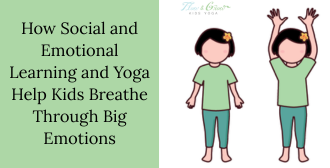
How Social and Emotional Learning and Yoga Help Kids Breathe Through Big Emotions
by Kane SEO April 21, 2025 4 min read

How Social and Emotional Learning and Yoga Help Kids Breathe Through Big Emotions
by Kane SEO April 14, 2025 4 min read
In classrooms and communities around the world, educators and parents alike are placing a growing emphasis onsocial and emotional learning. And for good reason: helping children understand, manage, and express their emotions in healthy ways is just as critical as teaching them to read or do math.

Power of Yoga for Kids: How It Helps Them Grow, Focus, and Thrive
by Kane SEO March 25, 2025 5 min read
In today’s fast-paced world, children are often exposed to stressors from a young age, whether it’s academic pressure, social challenges, or the overwhelming influence of digital devices. This can impact their physical, mental, and emotional well-being.
Ultimate Kids Year of Yoga Bundle
bundlespricey-contentdigital-resourcesearly-childhood-yoga-mindfulnesselementary-yoga-mindfulnesskids-yoga-resourcesmiddle-high-school-yoga-mindfulnessseasonal-yogayoga-cards
Ultimate Kids Year of Yoga Bundle
5 reviews
5.0 / 5.0
(5) 5 total reviews
$45.00
Ultimate Kids Year of Yoga Bundle
5 reviews
5.0 / 5.0
(5) 5 total reviews
$45.00
Kid’s Sun Salutation Yoga Cards
digital-resourcesearly-childhood-yoga-mindfulnesselementary-yoga-mindfulnesskids-yoga-resourcesliteracyunder-15yoga-cards
Kid’s Sun Salutation Yoga Cards
3 reviews
4.33 / 5.0
(3) 3 total reviews
$10.00
Kid’s Sun Salutation Yoga Cards
3 reviews
4.33 / 5.0
(3) 3 total reviews
$10.00
Yamas and Niyamas: Successful Relationships with Self & Others (tweens and teens)
pricey-contentdigital-resourceskids-yoga-resourceslesson-plansmiddle-high-school-yoga-mindfulnessmindfulness
Yamas and Niyamas: Successful Relationships with Self & Others (tweens and teens)
2 reviews
5.0 / 5.0
(2) 2 total reviews
$49.00$55.00
Yamas and Niyamas: Successful Relationships with Self & Others (tweens and teens)
2 reviews
5.0 / 5.0
(2) 2 total reviews
$49.00$55.00
